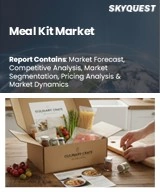
|
시장보고서
상품코드
1618443
밀키트 시장 규모 : 제공 유형별, 미르 유형별, 유통 채널별, 지역별, 범위 및 예측Global Meal Kit Market Size By Offering Type, By Meal Type, By Distribution Channel, By Geographic Scope And Forecast |
||||||
밀키트 시장 규모와 예측
밀키트 시장 규모는 2023년에 159억 달러, 2030년에는 523억 달러에 달할 것으로 예측되며, 예측 기간인 2024-2030년 CAGR은 18.7%로 성장합니다. 밀키트 시장은 소비자의 집 앞까지 배달되는 조리된 식재료와 레시피를 제공함으로써 가정에서의 식사 준비를 편리하게 만들어주는 시장입니다. 이러한 키트는 다양한 요리와 식사 옵션을 제공하여 다양한 소비자 취향에 대응하고 있습니다. 이 시장에는 정기 구매 기반 서비스와 일회성 구매 옵션이 있으며, 품질과 영양에 대한 타협 없이 편리하고 시간을 절약할 수 있는 식사 솔루션을 원하는 개인과 가족을 대상으로 합니다.
세계 밀키트 시장 성장 촉진요인
밀키트 시장 시장 성장 촉진요인은 다양한 요인의 영향을 받습니다.
편의성
편리성: 바쁜 스케줄과 바쁜 라이프스타일로 인해 사람들은 간편한 점심 식사 대안을 찾고 있습니다. 밀키트는 미리 정해진 양의 재료와 간단한 조리법을 제공함으로써 소비자들이 식료품 쇼핑, 식사 계획 및 준비에 소요되는 시간을 절약할 수 있도록 도와줍니다.
건강과 웰니스의 동향
사람들이 건강과 행복에 대한 인식이 높아지면서 건강하고 신선한 식사에 대한 수요가 증가하고 있습니다. 밀키트는 영양가 높은 식품, 저지방 단백질, 신선한 채소를 강조하여 건강 지향적인 소비자를 겨냥하고 있습니다.
요리에 대한 관심 증가
많은 사람들이 바쁜 일정에도 불구하고 요리하는 것을 좋아하고 새로운 요리에 도전하는 것을 좋아합니다. 밀키트는 식재료 구입과 식사 준비에 대한 스트레스 없이 요리를 시도할 수 있는 기회를 제공함으로써 요리를 보다 친숙하고 즐겁게 만들어 줍니다.
지속가능성에 대한 우려
환경 문제에 대한 인식이 높아짐에 따라 고객들은 지속가능한 식품 선택을 원하고 있습니다. 세심하게 계산된 식재료로 구성된 밀키트는 음식물 쓰레기를 줄이는 데 도움이 될 수 있습니다. 환경을 생각하는 소비자들에게 어필하기 위해 일부 기업은 친환경적인 포장과 조달 방법을 강조하고 있습니다.
COVID-19로 인한 소비자 태도 변화 :
COVID-19 팬데믹 이후 밀키트의 인기가 높아진 것은 식당 폐쇄, 사회적 거리두기 정책, 식품 안전에 대한 우려로 인해 집에서 요리하는 사람들이 늘어났기 때문입니다. 이러한 행동 변화의 결과로 밀키트 배달 서비스에 대한 수요가 급증하고 있습니다.
개인화 및 맞춤화
고객들은 보다 개성 있고 맞춤화된 식사 경험을 원하고 있습니다. 더 많은 고객에게 어필하기 위해 밀키트 제공 업체는 채식주의자, 비건, 무글루텐, 케토 프렌들리 옵션 등 다양한 식사 옵션을 자주 제공합니다.
도시화 및 인구통계학적 변화
도시화 추세와 1인 가구 및 소가족 가구 증가와 같은 인구 통계학적 변화로 인해 밀키트와 같은 간편하고 분량이 제한된 식사 솔루션에 대한 수요가 증가하고 있습니다.
기술 개발
밀키트 서비스의 편의성과 효율성이 향상되어 고객에게 더욱 매력적으로 다가갈 수 있게 되었습니다. 모바일 앱, AI를 활용한 추천, 더 나은 물류 및 배송 시스템 등이 이러한 발전의 예입니다.
세계 밀키트 시장 성장 억제요인
밀키트 시장에는 몇 가지 요인이 억제요인으로 작용할 수 있습니다. 여기에는 다음과 같은 것이 포함됩니다.
높은 가격대
밀키트는 일반 식료품점에서 장을 보거나 직접 요리하는 것에 비해 가격이 비싸다고 생각하기 쉽습니다.
커스터마이징 제한
밀키트는 편리하지만, 직접 만드는 요리만큼의 자유와 커스터마이징이 불가능할 수도 있습니다. 재료와 분량을 더 많이 관리하고 싶은 고객도 있을 것입니다.
정기 구매 피로감
대부분의 밀키트 서비스는 정기 구매에 의존하므로 이용자들은 서비스에 대한 의무감을 느끼거나 정기적인 비용에 압도되어 정기 구매 피로를 경험할 수 있습니다.
환경에 대한 관심
밀키트에는 일반적으로 포장이 포함되어 있으므로 폐기물이 발생하여 특히 플라스틱 사용 및 폐기와 관련하여 환경 문제를 제기 할 수 있습니다.
배송 물류에는 배송 누락, 배송 지연, 부패, 신선도 손상 등 많은 어려움이 있으며, 이는 모두 배송시 부품의 품질과 신선도에 영향을 미칠 수 있습니다.
식료품점과의 경쟁
전통적인 식료품점 및 소매업체가 밀키트 시장에 진입하여 자체적으로 포장된 대체 식품을 제공하는 것은 밀키트 전문 기업에게 경쟁적인 도전이 될 수 있습니다.
조리 능력 요건
밀키트는 조리 과정을 간소화할 수 있지만, 기본적인 조리 툴와 기술이 필요하므로 조리 능력에 자신감이 없는 고객들은 기피할 수 있습니다.
제한적인 산업 침투
밀키트 산업은 성장하고 있지만 다른 식품 분야에 비해 보급률이 아직 낮습니다. 이는 여전히 성장 기회가 있음을 시사하며, 더 많은 고객층에 도달하는 것이 어렵다는 점을 강조합니다.
목차
제1장 서론
- 시장의 정의
- 시장 세분화
- 조사 방법
제2장 개요
- 주요 조사 결과
- 시장 개요
- 시장 하이라이트
제3장 시장 개요
- 시장 규모와 성장 가능성
- 시장 동향
- 시장 성장 촉진요인
- 시장 성장 억제요인
- 시장 기회
- Porter's Five Forces 분석
제4장
밀키트 시장 : 제공 유형별
- Cook-It-Yourself 키트
- Heat-and-Eat 키트
- RTE 키트
제5장 밀키트 시장, 식사 유형별
- 채식주의자용 키트
- 비채식주의자용 키트
제6장 밀키트 시장 : 유통 채널별
- 온라인
- 식료품점
제7장 지역 분석
- 북미
- 미국
- 캐나다
- 멕시코
- 유럽
- 영국
- 독일
- 프랑스
- 이탈리아
- 아시아태평양
- 중국
- 일본
- 인도
- 호주
- 라틴아메리카
- 브라질
- 아르헨티나
- 칠레
- 중동 및 아프리카
- 남아프리카공화국
- 사우디아라비아
- 아랍에미리트
제8장 시장 역학
- 시장 성장 촉진요인
- 시장 성장 억제요인
- 시장 기회
- 시장에 대한 COVID-19의 영향
제9장 경쟁 구도
- 주요 기업
- 시장 점유율 분석
제10장 기업 개요
- Blue Apron
- HelloFresh
- Sun Basket
- Home Chef
- Freshly
- Purple Carrot
- EveryPlate
- Green Chef
- Martha & Marley Spoon
- Gousto
제11장 시장 전망과 기회
- 신규 기술
- 향후 시장 동향
- 투자 기회
제12장 부록
- 약어 리스트
- 전시와 참고 문헌
Meal Kit Market Size And Forecast
Meal Kit Market size was valued at USD 15.90 Billion in 2023 and is projected to reach USD 52.30 Billion by 2030 , growing at a CAGR of 18.7% during the forecast period 2024-2030. The Meal Kit Market encompasses the provision of pre-portioned ingredients and recipes delivered to consumers' doorsteps, facilitating convenient meal preparation at home. These kits offer a range of cuisines and dietary options, catering to diverse consumer preferences. The market includes subscription-based services, as well as one-time purchase options, targeting individuals and families seeking convenient, time-saving meal solutions without compromising on quality and nutrition.
Global Meal Kit Market Drivers
The market drivers for the Meal Kit Market can be influenced by various factors. These may include:
Convenience
: People are looking for quick lunch options due to their hectic schedules and busy lifestyles. By providing pre-portioned ingredients and simple-to-follow recipes, meal kits help consumers save time on grocery shopping, meal planning, and preparation.
Health and Wellness Trends
: People are becoming more conscious of their health and well-being, which is driving up demand for wholesome, freshly prepared meals. Meal kits target health-conscious consumers by emphasizing nutritious foods, lean proteins, and fresh veggies.
Growing Interest in Cooking
: Despite their hectic schedules, a lot of people like to cook and try out new dishes. Meal kits make cooking more accessible and pleasurable by giving people the chance to experiment with it without having to deal with the stress of food shopping and meal preparation.
Sustainability Concerns
: Customers are looking for sustainable food options as they become more conscious of environmental issues. Meal kits, with their carefully calculated ingredients, can help cut down on food waste, and in an effort to appeal to environmentally concerned consumers, several companies are emphasizing environmentally friendly packaging and sourcing methods.
Change in Consumer Attitude as a result of COVID-19:
Meal kits have been more popular since the COVID-19 epidemic because more individuals are cooking at home as a result of restaurant closures, social distancing policies, and worries about food safety. The demand for meal kit delivery services has surged as a result of this behavioral shift.
Personalization & Customization
: Customers are looking for more individualized and customized dining experiences. In order to appeal to a wider range of customers, meal kit providers frequently provide a number of meal options, such as vegetarian, vegan, gluten-free, and keto-friendly options.
Urbanization and Demographic Shifts
: The need for quick and portion-controlled meal solutions like meal kits is being driven by trends in urbanization and shifting demographics, such as a rise in single-person families and smaller households.
Technological Developments
: The convenience and effectiveness of meal kit services have been improved, making them more appealing to customers. Examples of these developments include mobile apps, AI-driven recommendations, and better logistics and delivery systems..
Global Meal Kit Market Restraints
Several factors can act as restraints or challenges for the Meal Kit Market. These may include:
High Price Point
: Compared to typical grocery shopping or cooking from scratch, meal kits are frequently thought to be more expensive, which may reduce their appeal to consumers on a tight budget.
Limited Customization
: Although meal kits are convenient, they might not provide you as much freedom or personalization as cooking from scratch. Certain customers would rather manage the ingredients and serving sizes more.
Subscription Fatigue
: Since many meal kit services rely on subscriptions, users may experience subscription fatigue as a result of feeling obligated to a service or overwhelmed by recurring costs.
Environmental Concerns
: Since meal kits usually include packaging, there may be waste produced and environmental issues raised, especially with relation to the use and disposal of plastic.
Delivery logistics provide a number of difficulties, including missing deliveries, delays, and damage to perishable goods, all of which can affect the quality and freshness of components when they are delivered.
Competition from Grocery Stores
: The entry of traditional grocery shops and retailers into the Meal Kit Market, along with their own pre-packaged meal alternatives, can be a competitive challenge to companies who specialize in meal kits.
Cooking Ability Requirement
: Although meal kits streamline the cooking process, they still call for basic cooking equipment and skills, which may put off customers who aren't confident in their ability to prepare food.
Limited industry Penetration
: The meal kit industry has grown, but its penetration rates are still low when compared to other food sectors. This suggests that there is still opportunity for growth and highlights the difficulties in reaching larger customer segments..
Global Meal Kit Market Segmentation Analysis
The Global Meal Kit Market is Segmented on the basis of By Offering Type, By Meal Type, By Distribution Channel and Geography.
Meal Kit Market, By Offering Type
- Cook-It-Yourself Kits
- : Meal kits that are intended for self-cooking are the most popular kind. They provide a recipe and all of the pre-portioned ingredients so you can prepare the meal at home.
- Heat-and-Eat Kits
- : These kits contain partially or fully cooked items that simply need to be warmed up before consumption.
- Ready-to-Eat Kits
- : These kits include prepared meals that are ready to eat..
Meal Kit Market, By Meal Type
- Vegetarian Kits
- : Those who eat a vegetarian diet are the target audience for these kits.
- Non-Vegetarian Kits
- : These kits contain fish, poultry, or meat.
Meal Kit Market, By Distribution Channel
- Internet
- : The Meal Kit Market's largest and fastest-growing segment is the internet one. Customers can purchase meal kits from the websites of meal kit providers and have them delivered right to their door.
- Food Stores
- : A few grocery stores have begun to sell meal kits at their establishments..
Meal Kit Market, By Geography
- North America:
- Market conditions and demand in the United States, Canada, and Mexico.
- Europe:
- Analysis of the Meal Kit Market in European countries.
- Asia-Pacific:
- Focusing on countries like China, India, Japan, South Korea, and others.
- Middle East and Africa:
- Examining market dynamics in the Middle East and African regions.
- Latin America:
- Covering market trends and developments in countries across Latin America.
Key Players
- The major players in the Meal Kit Market are:
- Blue Apron
- HelloFresh
- Sun Basket
- Home Chef
- Freshly
- Purple Carrot
- EveryPlate
- Green Chef
- Martha & Marley Spoon
- Gousto
TABLE OF CONTENTS
1. Introduction
- Market Definition
- Market Segmentation
- Research Methodology
2. Executive Summary
- Key Findings
- Market Overview
- Market Highlights
3. Market Overview
- Market Size and Growth Potential
- Market Trends
- Market Drivers
- Market Restraints
- Market Opportunities
- Porter's Five Forces Analysis
4.
Meal Kit Market, By Offering Type
- Cook-It-Yourself Kits
- Heat-and-Eat Kits
- Ready-to-Eat Kits
5. Meal Kit Market, By Meal Type
- Vegetarian Kits
- Non-Vegetarian Kits
6. Meal Kit Market, By Distribution Channel
- Online
- Grocery Stores
7. Regional Analysis
- North America
- United States
- Canada
- Mexico
- Europe
- United Kingdom
- Germany
- France
- Italy
- Asia-Pacific
- China
- Japan
- India
- Australia
- Latin America
- Brazil
- Argentina
- Chile
- Middle East and Africa
- South Africa
- Saudi Arabia
- UAE
8. Market Dynamics
- Market Drivers
- Market Restraints
- Market Opportunities
- Impact of COVID-19 on the Market
9. Competitive Landscape
- Key Players
- Market Share Analysis
10. Company Profiles
- Blue Apron
- HelloFresh
- Sun Basket
- Home Chef
- Freshly
- Purple Carrot
- EveryPlate
- Green Chef
- Martha & Marley Spoon
- Gousto
11. Market Outlook and Opportunities
- Emerging Technologies
- Future Market Trends
- Investment Opportunities
12. Appendix
- List of Abbreviations
- Sources and References



















